
Paul Brand 10am - 12pm
15 April 2024, 18:23 | Updated: 15 April 2024, 19:23
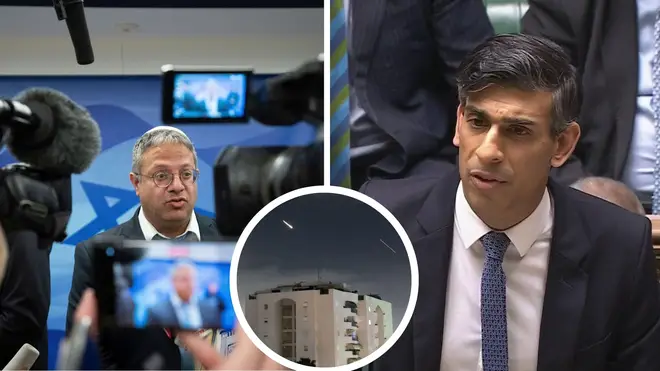
Israel must show it is "prepared to go berserk" on Iran the country's security minister has said, as Rishi Sunak urged Benjamin Netanyahu to exercise "restraint" to avoid a crisis in the Middle East.
In a statement released on Sunday evening following Iran's drone and missile attack, Israel's national security minister, Itamar Ben-Gvir, said: "Ideas of containment and moderation are the perceptions that ended on Oct 7".
It comes as the EU warned the Middle East is standing "on the edge of a cliff," with Rishi Sunak noting Iran sought to "plunge the Middle into a new crisis" with its attack, as he urged "all sides to show restraint".
The statement bore reference to the deadly October 7 Hamas terror attack, with the security minister suggesting a show of force was needed by Israel in response.
"To create a deterrent in the Middle East, Israel has got to show that it is prepared to go berserk,' he explained.
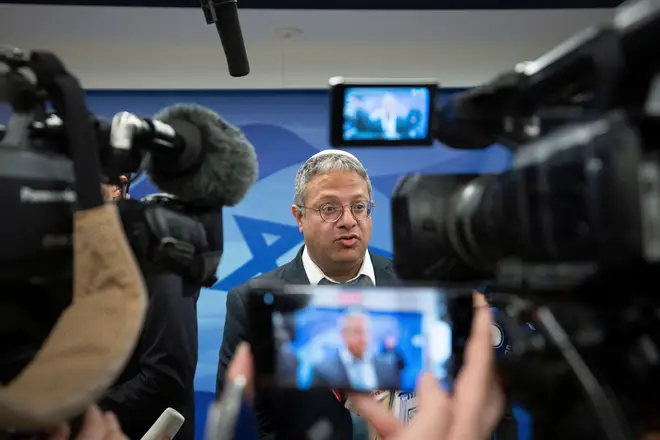
Earlier on Monday Mr Sunak said Iran - "a despotic regime" - had "shown its true colours" with its barrage of over 300 missiles and drones, and was "intent on sowing chaos in their own backyard".
The Prime Minister told MPs that the "fallout for regional security and the toll on Israeli citizens would have been catastrophic" if the attack had been successful.
Mr Sunak also warned that Iran's nuclear programme has "never been more advanced than it is today and threatens international peace and security".
Israel said Iran launched 170 drones, more than 30 cruise missiles and at least 120 ballistic missiles in an assault that set off air raid sirens across the country.
By Sunday morning Tehran said the attack was over and Israel reopened its air space having said it had intercepted along with its allies 99% of the projectiles launched towards its territory.
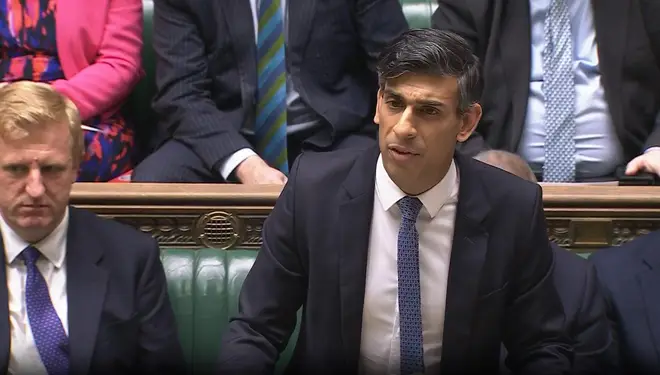
The assault came in response to a strike widely blamed on Israel on an Iranian consular building in Syria earlier this month, which killed two Iranian generals.
Israel said on Sunday evening that it had approved offensive and defensive military actions after Iran's attack, without giving more details.
Mr Sunak said on Monday that the UK and other allies "want to see calmer heads prevail", adding that "we are directing all our diplomatic efforts to that end."
He said that he would "shortly be speaking to Israel's prime minister Netanyahu to express our solidarity with Israel in the face of this attack, and to discuss how we can prevent further escalation."
Mr Sunak reiterated that the UK, along with other allies, took part in defending Israel, destroying several drones and providing "important intelligence surveillance and reconnaissance support". The UK is also moving more RAF aircraft to the region.

Watch again: David Cameron speaks to Nick Ferrari
The Prime Minister told the Commons that there were three key steps in returning the Middle East to peace.
"First we must uphold regional security against hostile actors including in the Red Sea, and we must ensure Israel's security - that is non-negotiable," he said. "It is a fundamental condition for peace in the region. In the face of threats like we saw this weekend, Israel has our full support.
"Second we must invest more deeply in the two state solution, that is what we have been doing over the past six months, including working closely with the Palestinian authority so that when the time comes they can provide more effective governance for Gaza and the West Bank.
"It is significant that other regional partners actually help to prevent a much worse attack over the weekend, it reminds us how important the attempts to normalise relations between Israel and its neighbours really are, and it holds out precious hope for the region.
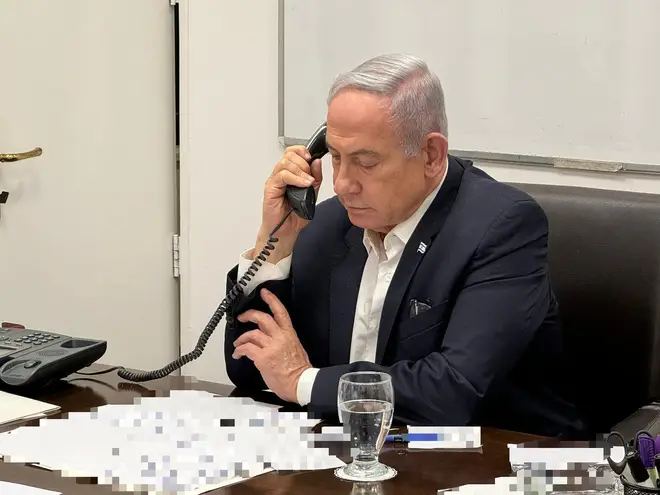
"Third, the conflict in Gaza must end, Hamas which is backed by Iran started this war, they wanted not just to kill and murder but to destabilise the whole region."
Mr Sunak also paid tribute to the three British aid workers who were among seven killed in an Israeli airstrike.
The PM said that Iran's attack was part of a growing trend of threats to global security.
He told MPs: "Saturday's attack was the act not of the people but of a despotic regime and it is emblematic of the dangers that we face today. The links between such regimes are growing: Tel Aviv was not the only target of Iranian drones on Saturday - Putin was also launching them at Kyiv."
He continued: "Who was the sole voice speaking up for Iran yesterday, seeking to justify their actions? Russia. The threats to stability are growing, not just in the Middle East but everywhere. and we are meeting those threats time after time with British forces at the forefront."
Labour leader Sir Keir Starmer said in response to Mr Sunak that he welcomed the actions of the RAF in helping defend Israel.
He told MPs: "There can be no doubt that the attack perpetrated by Iran over the weekend has left the world a more dangerous place.
"It must be wholly condemned by all, but we must also be clear that a full-scale conflict in the Middle East is in no one's interest.
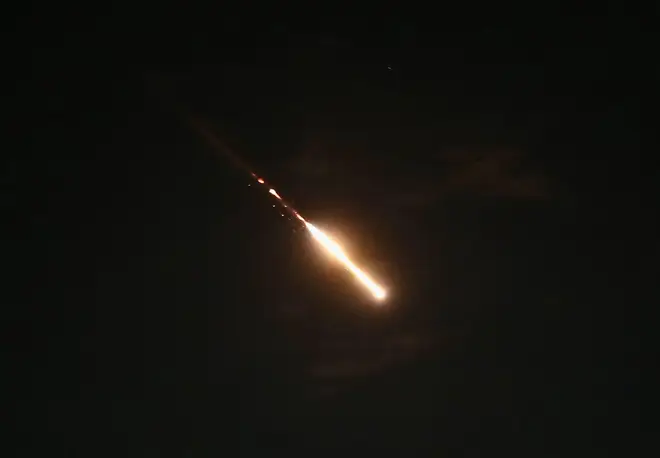
"It is a path that can only lead to more bloodshed and instability."
Labour and former Conservative Home Secretary Suella Braverman both called for the government to proscribe Iran's Islamic Revolutionary Guard Corps (IRGC).
Ms Braverman called the IRGC "the world's chief sponsor of terrorism".
She asked Mr Sunak: "We have proscribed Hamas, we have proscribed Hezbollah. Prime minister, why don't we put the UK's national security first by now proscribing the IRGC?"
Mr Sunak said that he would not comment on "potential proscription decisions", adding that the government understands the threat that Iran poses, and has "taken measures to counter it at home and around the world".
Mr Sunak and Sir Keir's comments come after David Cameron, the Foreign Secretary, also pushed to de-escalate the conflict in the Middle East.
Lord Cameron told Nick Ferrari on LBC on Monday morning that Iran's attack was “almost a total failure".
"Iran has suffered a double defeat,” he said. "As Biden said, take the win and focus now on Hamas."